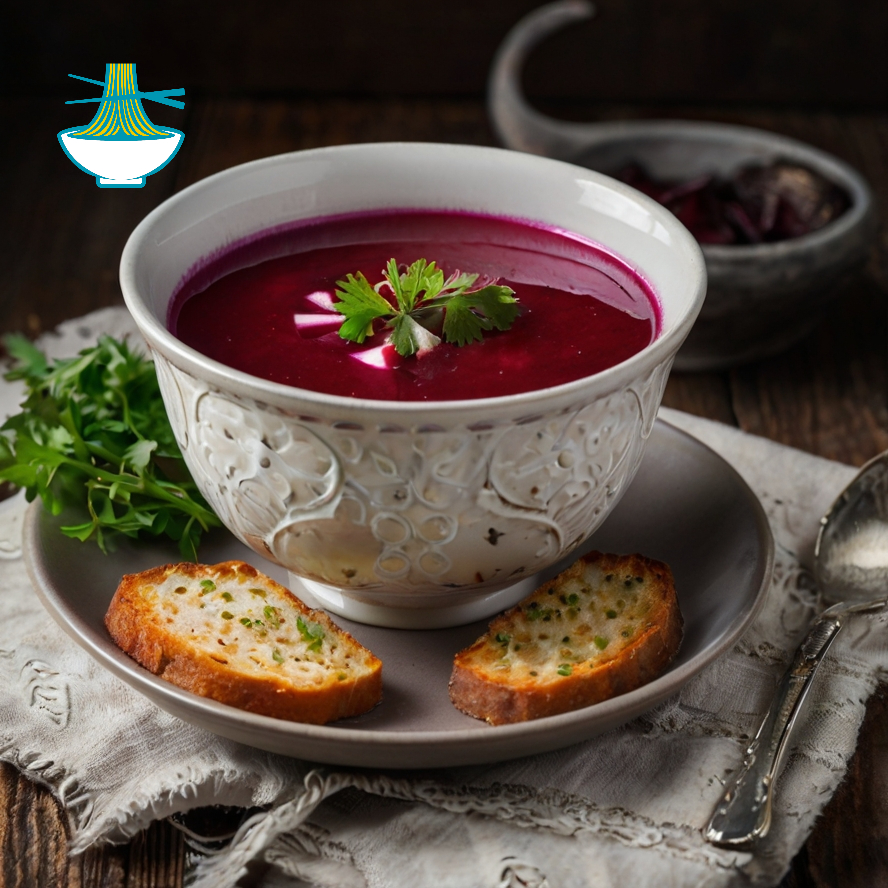Discover the ultimate guide to making traditional Borscht, a vibrant beet soup that’s perfect for any season. This versatile recipe can be enjoyed hot or cold and is often topped with a dollop of sour cream for extra richness. Learn how to prepare this classic dish with our easy-to-follow instructions and enjoy the bold, earthy flavors of this beloved Eastern European staple.
Ingredients:
- 2 medium beets, peeled and grated
- 1 large carrot, peeled and grated
- 1 onion, finely chopped
- 2 cloves garlic, minced
- 1/2 small cabbage, shredded
- 1 medium potato, peeled and diced
- 4 cups vegetable or beef broth
- 2 tablespoons tomato paste
- 1 tablespoon white vinegar
- 1 tablespoon sugar
- Salt and pepper, to taste
- 2 tablespoons vegetable oil
- Fresh dill, chopped (for garnish)
- Sour cream (optional, for serving)
Instructions:
Prepare the Vegetables: Heat vegetable oil in a large pot over medium heat. Add the onion and garlic, and sauté until translucent.
Cook the Beets and Carrots: Add the grated beets and carrots to the pot. Cook for about 5 minutes, stirring occasionally.
Add the Broth and Potatoes: Stir in the tomato paste, then add the diced potatoes and vegetable or beef broth. Bring to a boil.
Simmer the Soup: Reduce heat to low and simmer for 20 minutes, or until the potatoes and beets are tender.
Add Cabbage and Seasonings: Add the shredded cabbage, white vinegar, and sugar. Season with salt and pepper to taste. Simmer for another 10 minutes.
Serve: Ladle the soup into bowls and garnish with fresh dill. Add a dollop of sour cream if desired. Serve hot or chilled, according to your preference.
Enjoy your homemade Borscht, a comforting and flavorful soup that’s perfect for any occasion!
Nutritional Values
Beets (2 medium, peeled and grated)
- About 80 calories
- 0 grams of fat
- 20 grams of carbohydrates
- 2 grams of protein
Benefits: Rich in fiber, folate, and antioxidants. Supports heart health and improves blood flow.
Carrot (1 large, peeled and grated)
- About 30 calories
- 0 grams of fat
- 7 grams of carbohydrates
- 1 gram of protein
Benefits: High in beta-carotene, which converts to vitamin A. Supports vision and immune health.
Onion (1 large, finely chopped)
- About 45 calories
- 0 grams of fat
- 11 grams of carbohydrates
- 1 gram of protein
Benefits: Contains antioxidants and compounds that support heart health and have anti-inflammatory properties.
Garlic (2 cloves, minced)
- About 10 calories
- 0 grams of fat
- 2 grams of carbohydrates
- 0.5 grams of protein
Benefits: Known for its antimicrobial and anti-inflammatory properties. Supports cardiovascular health.
Cabbage (1/2 small, shredded)
- About 22 calories
- 0 grams of fat
- 5 grams of carbohydrates
- 1 gram of protein
Benefits: Rich in vitamins C and K. Supports digestive health and has antioxidant properties.
Potato (1 medium, peeled and diced)
- About 130 calories
- 0 grams of fat
- 30 grams of carbohydrates
- 3 grams of protein
Benefits: Provides carbohydrates for energy and contains vitamin C, potassium, and dietary fiber.
Vegetable or Beef Broth (4 cups)
- About 40-80 calories (depending on type)
- 0-5 grams of fat
- 2-10 grams of carbohydrates
- 2-4 grams of protein
Benefits: Adds flavor and provides essential minerals. Choose low-sodium versions to manage salt intake.
Tomato Paste (2 tablespoons)
- About 30 calories
- 0 grams of fat
- 7 grams of carbohydrates
- 1 gram of protein
Benefits: Adds rich flavor and provides vitamins A and C. Supports immune health.
White Vinegar (1 tablespoon)
- About 3 calories
- 0 grams of fat
- 1 gram of carbohydrates
- 0 grams of protein
Benefits: Adds acidity and enhances flavor. Can aid in digestion.
Sugar (1 tablespoon)
- About 45 calories
- 0 grams of fat
- 12 grams of carbohydrates
- 0 grams of protein
Benefits: Adds sweetness to balance flavors. Use in moderation.
Salt and Pepper (to taste)
- Minimal calories and macronutrients.
Benefits: Enhances flavor. Use in moderation to manage sodium and sodium intake.
Vegetable Oil (2 tablespoons)
- About 240 calories
- 28 grams of fat
- 0 grams of carbohydrates
- 0 grams of protein
Benefits: Adds richness and helps cook the vegetables. Provides essential fats but should be used in moderation.
Fresh Dill (for garnish)
- About 5 calories per tablespoon
- 0 grams of fat
- 1 gram of carbohydrates
- 0.5 grams of protein
Benefits: Adds fresh flavor. Rich in vitamins A and C and has antioxidant properties.
Sour Cream (optional)
- About 60 calories
- 6 grams of fat
- 2 grams of carbohydrates
- 1 gram of protein
Benefits: Adds creaminess and tanginess. Provides calcium and supports bone health.


Comments